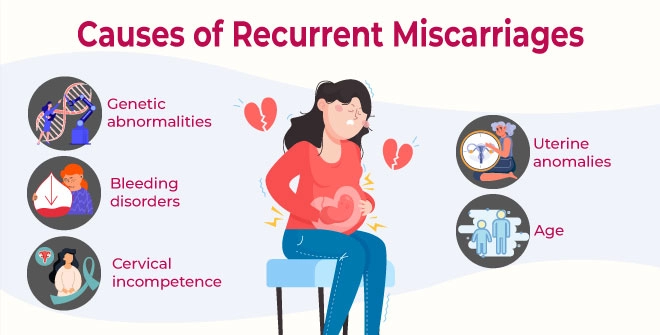20+ Years Of Experience as Fertility Specialists
20 Years Of Experience as a Fertility Specialists
National Fertility Awards 2023
Call Us
+919990044555
Ultrasound scans are a crucial part of prenatal care, providing essential information about the health and development of your baby throughout pregnancy. In this blog, we will discuss the purpose and timing of various ultrasound scans during pregnancy and why they are so important for both mother and baby.
If you want to know more details: High-Risk Pregnancy: Dos and Don’ts
Recurrent Miscarriages: An Overview
A miscarriage is Defined as the spontaneous Loss of a Pregnancy Before the 20th week. Recurrent miscarriages refer to the loss of three or more consecutive pregnancies. Even two consecutive miscarriages can be considered a case of recurrent miscarriage, warranting further investigation.
Book An Appointment
Follow Us On
There are different types of miscarriages:
a) Early miscarriages: Occurring within the first seven weeks of pregnancy, before the heartbeat is formed.
b) Delayed miscarriages: Occurring between seven and 12 weeks of pregnancy, after the heartbeat is formed.
c) Missed miscarriages: Asymptomatic miscarriages, only detected through ultrasound.
d) Spontaneous miscarriages: Occurring with bleeding and other symptoms.
e) Inevitable miscarriages: Occurring with heavy bleeding, requiring emergency dilation and curettage (D&C).
If you want to know more details: Is Ovary Size Important To Get Pregnant?
Causes of Recurrent Miscarriages
In 70% of cases, there is no apparent cause for recurrent miscarriages, and many couples go on to have successful pregnancies with proper care and support. However, some common causes of recurrent miscarriages include:
a) Genetic abnormalities: Chromosomal issues in either parent can contribute to recurrent miscarriages. Genetic testing can help identify potential problems and guide treatment options.
b) Uterine anomalies: Abnormalities in the shape of the uterus, called Müllerian abnormalities, can include bicornuate, septate, and unicornuate uteri. These can interfere with the implantation and growth of the fetus, leading to miscarriage. Surgical interventions may be an option in some cases to correct these abnormalities.
c) Bleeding disorders: Thrombophilia, a condition that causes blood clotting, can disrupt blood supply to the developing fetus. Anticoagulant medications and close monitoring may be recommended for women with this condition.
d) Age: Women over 35 and men over 40 may experience increased risk of miscarriage due to poor egg quality or DNA fragmentation in sperm. Age-related fertility decline is a natural process, but treatments like in vitro fertilization (IVF) and donor eggs or sperm can help improve the chances of a successful pregnancy.
e) Cervical incompetence: Miscarriages can occur around 4-5 months if the cervix is weak and cannot hold the pregnancy. A procedure called cervical cerclage can be performed to reinforce the cervix and reduce the risk of miscarriage.
Other minor causes may include:
- Low levels of folic acid production enzymes
- Thyroid hormone abnormalities
- Immune system factors
If you want to know more details: Can Fallopian Tubes Cause Miscarriage?
Coping with Recurrent Miscarriages: Emotional and Psychological Support
Experiencing recurrent miscarriages can take a significant emotional toll on both partners. It is essential to allow yourself the time and space to grieve and process your feelings.
Seeking support from family, friends, and support groups can be helpful during this time. Additionally, consider working with a therapist or counselor experienced in helping couples deal with fertility issues.
Finding the Right Healthcare
Team Working with a team of healthcare professionals who specialize in recurrent miscarriages can make a significant difference in your journey toward a successful pregnancy.
This team should include experts in reproductive endocrinology, genetics, and maternal-fetal medicine, as well as skilled therapists and counselors to address the emotional aspects of recurrent miscarriages.
Treatment Options and Success
Stories There are various treatment options available depending on the specific cause of recurrent miscarriages. For genetic abnormalities, preimplantation genetic testing (PGT) during IVF can help identify healthy embryos for transfer.
In cases of uterine anomalies, surgery may be an option to correct the issue and improve the chances of a successful pregnancy.
For women with bleeding disorders, anticoagulant medications and close monitoring may be recommended. In the case of cervical incompetence, a cerclage procedure can help reinforce the cervix and reduce the risk of miscarriage.
Many couples who have experienced recurrent miscarriages go on to have successful pregnancies with the help of a knowledgeable and compassionate healthcare team.
One inspiring example is a woman who suffered six miscarriages before seeking specialized treatment. After an extensive treatment plan, we were able to help her conceive and deliver a healthy baby.
Another success story involves a couple who experienced five miscarriages before finding the right solution at our centre. With Personalized care, they were able to overcome their fertility challenges and welcome a healthy baby into their family.
If you want to know more details: Tips for a Healthy Pregnancy
Wrapping up
Recurrent miscarriages can be an emotionally tiring experience for couples, but it’s essential to remember that there is hope. With the right healthcare team, appropriate investigations, and individualized treatment plans, many couples can overcome recurrent miscarriages and achieve a successful pregnancy.
If you are struggling with recurrent miscarriages, it’s crucial to reach out for support and explore your treatment options. The journey may be challenging, but with perseverance, empathy, and expert care, many couples can ultimately achieve their dream of welcoming a healthy baby into their lives.
Share this with
Related Videos
What is TORCH test in infertility and why is it done?
There are numerous tests that are available to infertile couples that are recommended by some doctors, which might help them determine the cause of their infertility. One such test is the TORCH test.
What is Prolactin Hormone?
Prolactin is a hormone produced by the pituitary gland present at the brain’s base. It is best known for its role in lactation, or milk production, in breastfeeding women.However, Prolactin also plays other important roles in both men and women, such as regulating the immune system, stimulating the growth of new blood vessels, and influencing behaviour and reproductive function. In this blog, we will explore what Prolactin is, how it works, and what happens when there are imbalances in prolactin levels.
Follow Us On
About Author








